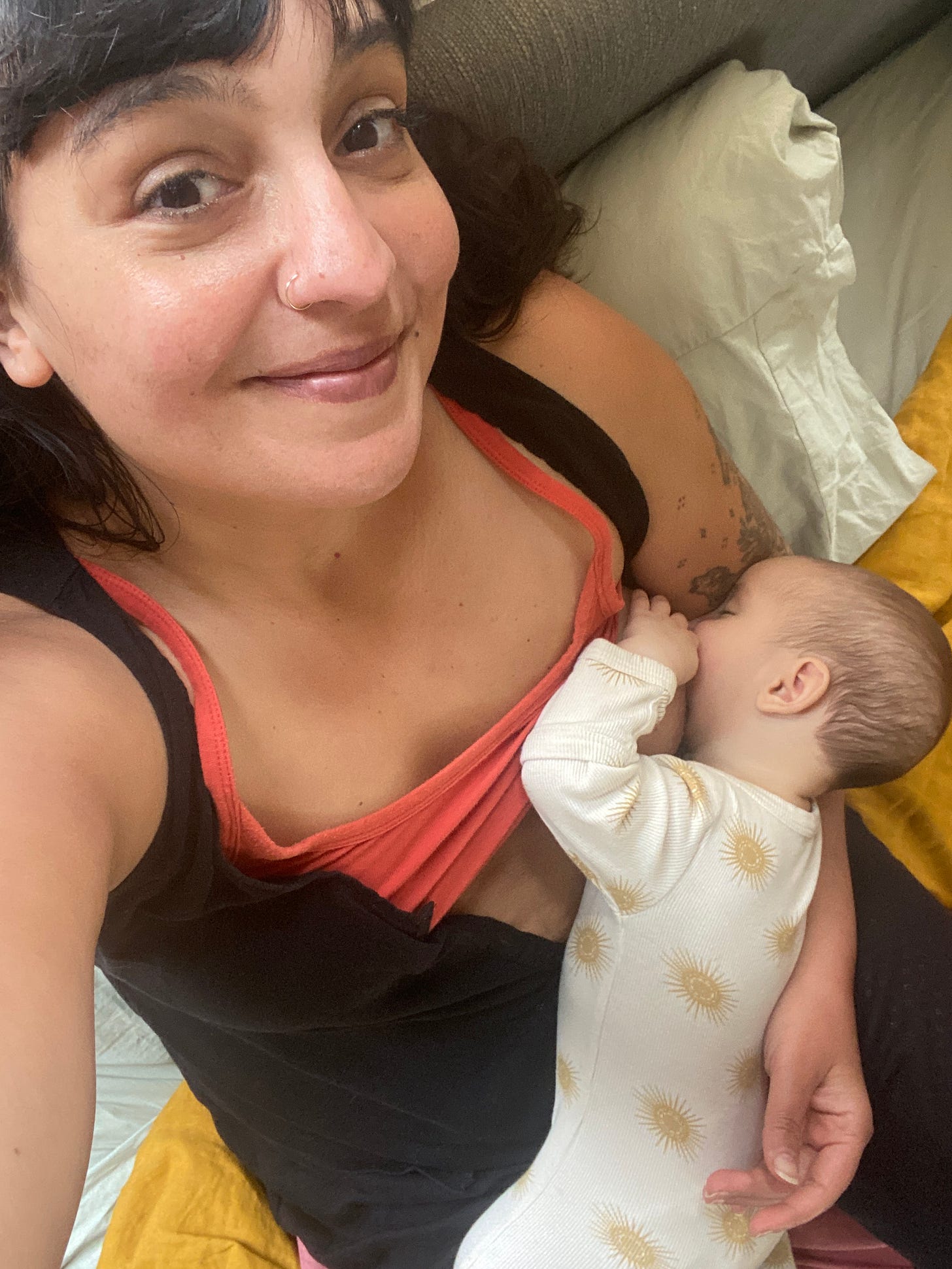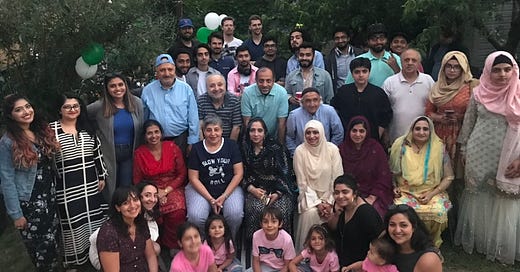On evidence, intuition, and asking someone to flush the toilet
Or, this is what I write about when I don't want to write about loss (plus, a question for readers)
Comrades, I write to you from the desk in my bedroom in the dusky light of a Brooklyn spring, in a moment stolen from palpating bellies and auscultating heart tones, from worker’s comp policy emergencies and the Kafkaesque saga that is attempting to secure necessary medications for my clients in a for-profit health care hellscape, from children’s dental visits and round-the-clock nursing and a husband who needs his latest academic article revised, from drawers filled with maternity clothes for a person who is no longer pregnant and 0-3 month clothing for a baby whose feet threaten to bust through everything that size, and everything in between. Although that sounds like a lot (and it is), rest assured1 I have made sure to maintain some spaciousness and time in there. Time to stare at my baby, still mystified and delighted by his existence: the fuzzy chick quality of his hair, the fascinated intensity with which he tracks his siblings from across the room, the way his fingers trace and clutch the folds of my shirt as he nurses. Time to laugh aloud as I read The True Meaning of Smekday with Illy, time to spontaneously buy ice cream for Jo and my niece Kiran on the way home from the park (and then take the time to bring my other niece, Mina, to the corner store when she is sad she’d missed it), time to watch “Jane the Virgin” with Wren at night. Yes, I have to do the meal planning and write out the grocery list, but there is also time to put Colson’s Raspberry Jam donuts on it (something the Park Slope Food Coop started carrying toward the end of my pregnancy and which on the occasions I indulge in them, taste like the magic of that time). I must continually, endlessly add to and cross off from my to-to list, but I also find time to scribble small, daily delights in my journal:
The way my sister walked in and announced herself at family dinner
Seeing a little girl walk across the street dragging a pull toy behind her
Hanif giggling during diaper changes in the park
The taste of roasted fennel
And so on
I write to you from all of those places, but most of all, I write to you from a heart that is grieving, along with the rest of my family, the devastating and tragically premature loss of my gentle, kindhearted uncle.
In the week since his death, I’ve spent a lot of time with my extended family, family that I used to see every single day because I grew up in a multigenerational household where my father’s 7 brothers and sisters, along with their spouses and children, lived with us, but who in the last three years I have mostly seen very little. To all be together in this way again has me thinking a lot about family dynamics, about how the stories of our families – both known and unknown – not only shape us in childhood but continue to influence us throughout our lives. In that paradox that is family of origin, everything good about me can probably be traced to something about the way I grew up and yet everything about me that has needed to be healed, or unlearned, also can be traced to something about the way I grew up. I have had to overcome so much family trauma, but my family is also the source of so much redemption, so much generosity, and so much of what makes me, well, me.
I’m not sure whether the way I grew up – which, given it involved 30-40 people living in one three story Brooklyn row house at a time, probably sounds idyllic or nightmarish depending on your perspective – is something that is of interest to those who subscribe here, seeing as it’s not specifically about birthwork or parenting. In truth, either perspective would be right: it could be both an idyllic and nightmarish, complicated in almost every way an immigrant family that included some half-white children, could be complicated. But it was mine, and there is no honest or complete way to talk about my life as a midwife without talking about that house, because I don’t think I’d be who I am as a midwife, or a parent, without it.
I’m not sure I’m ready to write about that this week, though: everything feels raw and tender and unfocused, more a feeling buzzing just below my skin, or maybe lingering like current on it, than narrative.
So, instead, here are a few of the other raw, unfocused thoughts/things I’m thinking about this last week. I’ve been scribbling some of these as bullet points in my journal, or drafts in my email, or uttering ideas about them into my phone’s voice memos, but have not yet been able to translate any into the sort of robust, complete article yet. I figure now is as good a time as any to take the temperature of the community here and see what topics are most resonating with you all. If you would, I’d love to hear your thoughts in the comments about which to prioritize.
First, there’s this study that came out this week, which uses data from a Michigan Statewide Maternity Hospital Quality Initiative to evaluate whether hospitals who adopted the practices of the 2018 ARRIVE trial have confirmed its findings. In case you’re not familiar, the ARRIVE trial, which analyzed 41 hospitals and 6106 first-time birthers, concluded that elective induction at 39 weeks improved the c-birth rate from 22% in 19% (or 3 fewer per 100) as compared to expectant management. Obstetricians jumped on the ARRIVE bandwagon with an enthusiasm they’ve heretofore reserved for the 2001 Term Breech Trial (which resulted in vaginal breech delivery completely disappearing as an option for birthing women and people almost overnight). Because it ultimately reinforces most obstetricians’ agenda of “delivering” people from the pathology that is pregnancy sooner than later anyway, ARRIVE has been integrated into practice much more quickly than any of the other interventions that more significantly improve the c-birth rate, such as childbirth education, working with a doula, or choosing a midwife rather than an OB.
This Michigan Study is not the first to call into question the results of the ARRIVE trial, which anyone on the ground in birthwork who wasn’t an obstetrician intuitively questioned, but it is, as far as I know, the most robust in finding an increased rate of c-birth. One other recent study has found an increased rate, but in a much smaller cohort; other studies have found no change in c-birth rates either way, which is to say, they disprove the conclusions of the ARRIVE trial but also have not found data to actively discourage elective induction on the basis that it is linked to increased c-birth rate, though they have found other reasons to actively discourage it in the form of increased cost (vis-a-vis longer hospital stays and resources), chorioamnionitis, rate of hemorrhage and transfusion, lower APGARS, and low birth weight (in addition to the other three I linked see this one).
There’s so much to write about when it comes to ARRIVE, as well as these follow-up studies. But whenever I engage in the nitty gritty of data, something that increasingly is on my mind is my own relationship with it. “Evidenced based” is often presented as a flex, probably because most of obstetric practice is decidedly not evidence based: it routinely ignores evidence on everything from the safest ways to push to the long-established benefits of delayed cord clamping to the very common sense conclusion that if you are afraid of someone developing an infection in the setting of ruptured membranes, then it makes sense to NOT DO THE THING THAT WOULD CAUSE AN INFECTION.
But the longer I practice, the more I realize that the reliance on evidence as the Gold Standard for practice is in and of itself a white supremacist characteristic, one that elevates that which is quantifiable over all ways of knowing. How we quantify is borne of structural racism and patriarchy – who is represented, how we design studies, and even the questions we prioritize in the first place all reflect those realities. As much as we want to pretend that data is “objective,” it is designed and interpreted by humans who have subjective priorities and biases. And in the case of birth, what is studied is usually biased toward the interests of the Medical Industrial Complex rather than the women and people doing the birthing and the babies being born. It’s also important to point out that we don’t study physiologic birth – we pretty much exclusively study medically managed birth. “Science” literally has no idea what is normal for birth that is not being medically managed, but even stepping outside of your home is in and of itself an intervention that alters the hormones and physiology of birth. There is no physiologic “control” in most studies. In the case of ARRIVE, for example, researchers didn’t compare those electively induced at 39 weeks to those who went into labor physiologically; they compared them to those “expectantly managed,” which means that in many cases they were comparing inductions to inductions (and, speaking as someone who has worked in the MIC, it makes complete sense to me that obstetricians would have less patience for an induction at 41 weeks than one at 39 weeks). There is little to no investment in studying birth outside of the presumed “safety” of medical management even if medicine’s own evidence continually proves that the safety of that management is questionable.
What this means is that I can’t actually be evidence based, even if I wanted to be. The best I can be is evidence-considerate, because the evidence around the kinds of births I am trying to facilitate don’t exist. And at the end of the day, “evidence” is simply not the only way of knowing that is valuable. Midwifery, I’ve learned, is equal parts science and intuition; there is so much science will never be able to explain about what I do.
I had a potent experience of that recently, an experience I’ve been trying to find the words for for a few weeks now. It’s the experience of attending one of the more magical births of my career – which, in the way that life is so often a paradox, also happens to be one of the more emergent I’ve ever attended. Being part of that birth has my brain swirling around the fact that while I would never choose to attend an obstetric emergency alone at home, with one Birth Assistant, and without the infrastructure and support and resources of an entire hospital…I cannot deny that I’ve been able to manage emergencies, for the most part, more expediently, smoothly, and more atraumatically in that setting, without the cortisol and chaos of hospital emergencies. In my experience, most of the latter feel like the frenzy of a zoo stampede, and I've never been able to understand why having the security of all those resources and a full team in place seems to result in more panic. At home, I’ve also been able to implement evidence-based practice (there’s that word again) like leaving the cord intact and the infant on their parents’ chest during resuscitation.2
But even more then all of this, the thing I’m thinking most about that birth is the thing I can explain the least about it, and it is this: the otherworldly, spiritual connection I had with that baby as she was born. The way she communicated to me; the way I heard her; the way I knew her, because my own baby self had had a similar experience to her; the way we were together, in some third space between life and death, her and her mother and me and myself as a baby. The way in which science would discount that as a delusion. The way in which science wouldn’t believe in that because it isn’t quantifiable.
But as much as I hesitate to quote a white man here: we are large, we contain multitudes. Multitudes that aren’t and never will be quantifiable. Multitudes that often become most perceptible in these liminal experiences of birth and death, the only two universals of life.
Here’s a few other things I am thinking and writing about: reader questions about why I, a midwife, chose to birth unassisted; the tensions between the obstetric-dominated pushing narrative I wrote about last week and the social media fetishization of the fetal ejection reflex and “breathing baby down” as somehow being effortless; epidurals neither being risk free nor always pain free but most importantly something a vast majority of birthers want to avoid prior to giving birth even though over 70% ultimately get them, and why that’s so; reader requests to write about why we as a family unschool; whether framing vaginal and perineal tearing as pathological is a manufactured narrative (truthfully this isn’t a question for me because I believe the ability to tear and heal is testament to the innate intelligence of the body); why there is a note on my iPhone nestled between drafts and snippets of writing titled “What if I’m not a martyr?” and “Evidence -based principles to reduce tearing” that says “Can you flush the toilet” with no question mark (okay that last one might not make a very compelling article, though it remains a very good question).
Dear reader, I’ll stop there with the little window into my ever-churning, ever-questioning brain. Let me know in comments which topic you’d like me to tackle in the next newsletter, and until then I’ll remain
Yours in the raw, tender, haze that are the highs and the lows of this life,
Robina

Pun 1000% intended: thanks, English PhD.
Whenever I think about obstetric emergency, I’o left thinking about the way so many of them are manufactured by the very interventions meant to keep us safe, as I talk about a bit here. I also am perpetually considering the way in which so many people are leave their births believing they were emergencies where they or their babies almost died, but were actually just routine, run-of-the-mill MIC births with routine, run-of-the-mill MIC interventions. Just today, as a matter of fact, as my daughter was getting her teeth cleaned, the dentist told me that she had been “scheduled” for an “emergency c-section” (a contradiction in terms, of course) for her second baby being both “sunny-side up” and “big” (the excellent punch line of this story, by the way, is that she left the provider and found another willing to let her labor, and she gave birth vaginally to an 8lb, occiput anterior baby). Dear reader, sending people home with the idea that they were saved from certain disaster by medical professionals does a particular work in our society, and it’s worth thinking and talking about what that work is.






As others have mentioned, I would be happy to read about any of the topics you mentioned! The top 3 that stuck out to me based on my own musings would be:
1. The Arrive trial shenanigans
2. “Epidurals neither being risk free nor always pain free but most importantly something a vast majority of birthers want to avoid prior to giving birth even though over 70% ultimately get them, and why that’s so”
3. The experience of growing up with so many family members, and how that experience continues to influence you
Came here to say that I want to read literally everything you suggested – I want to know how you lived in one home with so much extended family, I want to learn more about unschooling, and absolutely anything you have to say about birth.